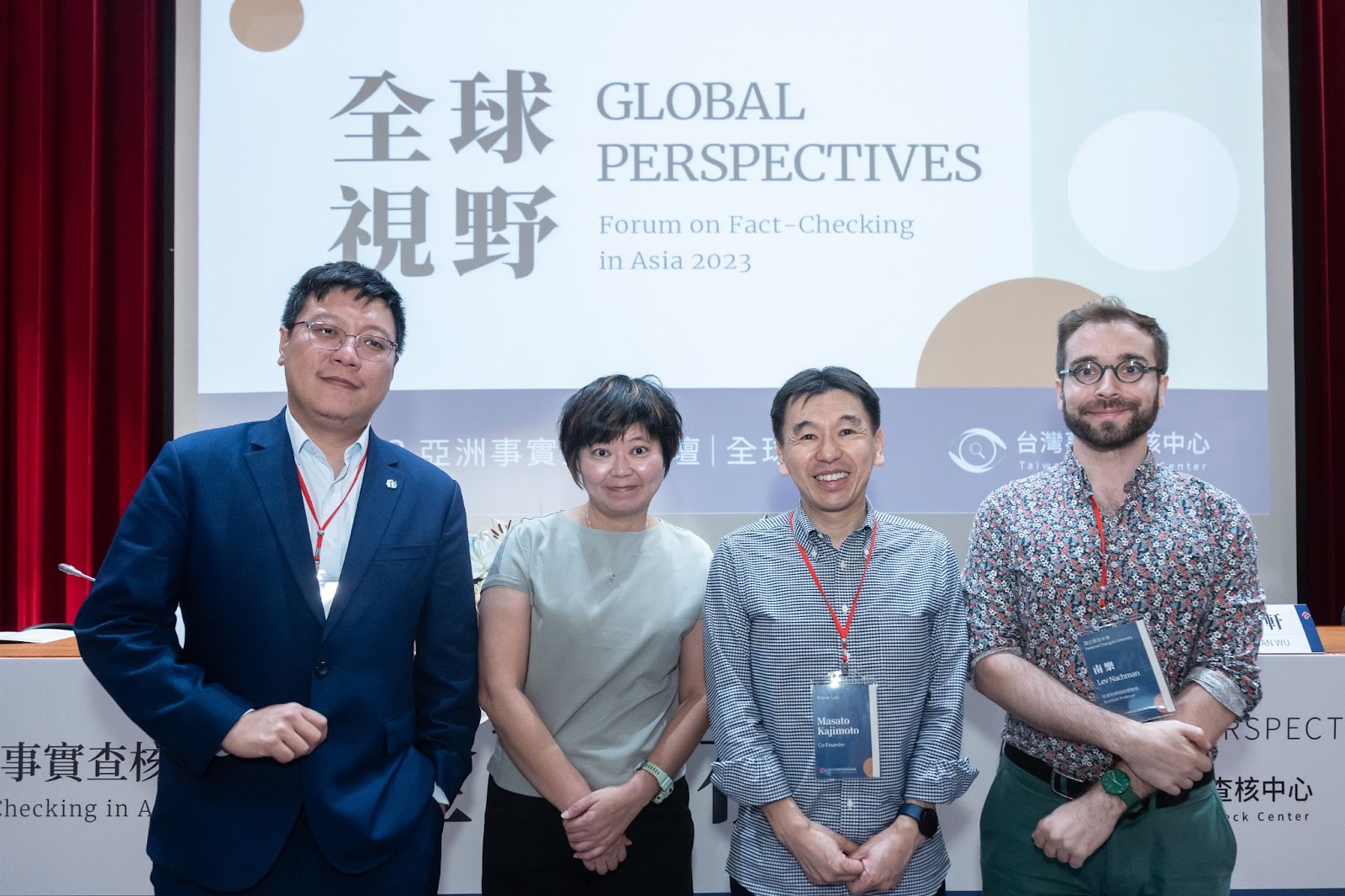China factor in media poses different challenges to fact-checking
How fact-checking organizations in the Chinese-speaking region cope with disinformation was a focus of attention of the panel on the China factor on the second day of the Forum on Fact-Checking in Asia 2023. The “China factor” has taken different forms in different societies but made the task of fact-checking more complex all the same.
The panel on July 4 was moderated by Lev Nachman, assistant professor at the College of Social Science at National Chengchi University. The three panelists were Masato Kajimoto, associate professor at the Journalism and Media Studies Centre at the University of Hong Kong and co-founder of Annie Lab; Summer Chen, editor-in-chief of the Taiwan FactCheck Center; and Min-Hsuan Wu, co-founder and CEO of Taiwan’s Doublethink Lab.
Image: (From left) Assistant professor at the College of Social Science at National Chengchi University Lev Nachman, associate professor at the Journalism and Media Studies Centre at the University of Hong Kong and co-founder of Annie Lab Masato Kajimoto, editor-in-chief of the Taiwan FactCheck Center Summer Chen; and Min-Hsuan Wu, co-founder and CEO of Taiwan’s Doublethink Lab. (Photo/ Yuan-Bin Zhao)
China Factor at Work
Kajimoto said he believes the disinformation Hong Kong is coping with is embedded in a different context from that of Taiwan.
He found that in the U.S.-China geopolitical tensions, narratives about Western liberal democracy and a non-Western Chinese way of governance have both been rising and colliding. Disinformation has emerged from both “pro- and anti-China” camps in the city, further polarizing the society with this Cold War mentality.
Image: Associate professor at the Journalism and Media Studies Centre at the University of Hong Kong and co-founder of Annie Lab Masato Kajimoto. (Photo/ Yuan-Bin Zhao)
Chen said to understand China’s surveillance of information requires understanding how the Chinese government undertakes highly intensive surveillance on the media and information platforms. As most of the China-related information comes from Chinese official media outlets or is part of Beijing-permitted political campaigns, “disinformation” is only one of the tools used to control information, Chen said.
China operates different levels of surveillance in other regions, Chen continued. In mainland China, for example, a fire broke out in a hospital in Beijing in April, and for an entire span of eight hours, no related information was seen on the internet or in the news, which shows the strong self-censorship of the Chinese media and the strength of the party-dominated algorithms in controlling social media.
Image: Editor-in-chief of the Taiwan FactCheck Center Summer Chen (left) urged to understand how the Chinese government undertakes highly intensive surveillance of the media and information platforms. (photo/ Yuan-Bin Zhao)
Xinjiang is a case of extreme persecution, but Hong Kong, a city that used to enjoy media independence, is now also witnessing media self-censorship after countless arrests of journalists and attacks on the city’s media industry.
Taiwan is a democratic society that is outside the PRC’s sovereign border and, therefore, has been treated by Beijing with different tactics and strategies, which have “improved” over time and put the methods and investigation techniques of the fact-checking organizations in Taiwan to test especially during Taiwan’s election period.
The China Index
The Doublethink Lab has since 2019 worked to connect research institutions that have been looking into China’s influence and co-established with them a “China Index” to assess China’s influence and the level of China’s political, economic, and cultural infiltration in each country, according to Wu.
Image: Co-founder and CEO of Doublethink Lab Min-Hsuan Wu. (Photo/ Yuan-Bin Zhao)
Taiwan ranked 11th in the Index, while the top five most exposed to China's influence were Pakistan, Cambodia, Singapore, Thailand, and Peru. But Taiwan is among the most affected by China’s pressure in the realms of media, legislature, and society.
Wu also echoed Chen in that the media and the internet are highly controlled by the government in China, and therefore, the views emerging on social media are the result of the deliberate selection that Beijing uses to solidify people’s trust in the regime.
Anti-China sentiment?
Kajimoto said it would be harder to fact-check government-initiated disinformation, but media workers and fact-checkers should remain indifferent to any influence and not be swayed by emotions such as anti-China sentiments.
Chen agreed, saying that a fact-checking reporter is trained to be nonpartisan when facing rumors. That’s why the TFC is a non-partisan organization, she stressed, adding that messages tinged with anti-China sentiments have also been checked by the TFC, sometimes making it subjected to criticisms calling it a pro-China group that lacks Taiwanese values.
TFC’s role and job is to provide accurate and correct information to the public and nothing else, she said.
You can read the Chinese version of this article here.






